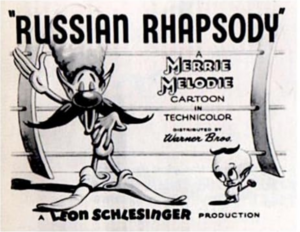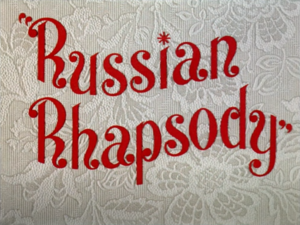Russian Rhapsody
| WARNING! This article contains content that may not be seen as age appropriate or upsetting for some readers. Reader discretion is advised. |
| Russian Rhapsody | |
|---|---|
 Lobby card. | |
| Production company | Leon Schlesinger Productions |
| Distributor | Warner Bros. Pictures The Vitaphone Corporation |
| Release date | May 20, 1944 |
| Run time | 7:06 |
| Starring | Mel Blanc Robert C. Bruce Bea Benaderet |
| Music composition | Carl W. Stalling |
| Story | Lou Lilly |
| Animation | Rod Scribner Robert McKimson[1] (uncredited) |
| Director(s) | Robert Clampett |
| Series navigation | |
| ← Previous | Next → |
| Title card | |

| |
Russian Rhapsody is the two hundred and thirty-ninth Merrie Melodies theatrical short. It was distributed by Warner Bros. Pictures and The Vitaphone Corporation on May 20, 1944. It was written by Lou Lilly, produced by Leon Schlesinger, and directed by Bob Clampett.
In the midst of World War II, Fuhrer Adolf Hitler appoints himself on a mission to bomb Moscow. On his way, a group of gremlins from the Kremlin sneak onto his plane and start dismantling it in tune to Russian songs.
Detailed summary
| This article or section is a stub. You can help the Looney Tunes Wiki by expanding it. |
Memorable quotes
Adolf: Stoupnegel hamburger, mit der frankfurter und der sauerkrauten, mit der zoot suit, mit der reet pleat, zoot! Schtunk Friz Freleng, mit der Heinrich Binder, und der What's Cookin', Doc? Pumpernickel mit sauerkrauten from der delicatessen, mit liverwurst, hasenpfeffer, und der Chattanoga Choo-Choo! Gesundheit! We will bomben der Moskau, bomben Schtalin, bomben that Irish general Tim O'Shenko! (cries) That O'Shenko... To bomb Moscow, I will send the best pilot in the R-r-reich-ch-ch! The greatest superman of all times!
Man in crowd: Who's that? You, Fuhrer?
Adolf: Nyeh, who else?
Adolf: Ach! A gremlin from the Kremlin!
Gremlin: How do you do?
Adolf: Nazis is the craziest peoples! Oh-ho-ho-ho-ho-ho!
Characters
Characters
In order of appearance: | ||||||||||||||
| ||||||||||||||
Organizations
Locations
Objects
- Mallets
- Pickaxes
- Torch gun
- Handsaw
- "Termiteskis" box
- "C" card
- "A" card
- Electric plug
- Knife
- Joseph Stalin mask
Vehicles
- German bomber plane
Production
Filming
The short was copyrighted in 1944 (MCMXLIV).
Music
The score was composed by Carl W. Stalling. The main title and closing themes are a rendition of "Merrily We Roll Along," which are arranged by Stalling.
Release
Dates are in order of release:
- United States: May 20, 1944
Behind the scenes
- The MPAA certificate number is 9231.
- Among the subjects Hitler mentioned in his speech include animator Friz Freleng and producer Henry Binder (whom Hitler refers to as "Heinrich Binder"), the Bugs Bunny short What's Cookin' Doc, the song "Chattanooga Choo Choo," and Soviet military commander Semyon Timoshenko ("that Irish general Tim O'Shenko").
- For unknown reasons, an abrupt cut occurs between a scene of the gremlins scaring Hitler with a Stalin mask and said gremlins cutting the plane's floor to drop Hitler.
- Due to the short's heavy use of World War II themes, including its depiction of Hitler, this short is almost excluded on U.S. television, although it did air as part of Cartoon Network's The Bob Clampett Show—a two-hour weekend installment of The Acme Hour programming block—and on the ToonHeads special "The Wartime Cartoons."
Critical reception
In The 100 Greatest Looney Tunes Cartoons, animator Mark Kausler writes in the following text:
"Russian Rhapsody is a funny musical cartoon about a man who was certainly the antithesis of comedy. The breadth and depth of Hitler's hatred of Jews and crimes against humanity were not fully known in 1944, when this cartoon was released. Director Bob Clampett, as usual, cast his animators well, giving Bob McKimson a showcase for his exceptional performing and drawing ability in the extended animated close-up of Hitler addressing the Nazi party faithful. McKimson makes Hitler a monster with huge shoulders and huge hands that reach out toward the camera in sweeping gestures. The range of emotions that Hitler goes through in his speech—from slobbering hatred as he rolls his r's, to teary resignation as he recalls the "Irish" General Tim O'Schenko (Russian Marshal Timoshenko), to his "Who else?" quip at the end, an impression of Yiddish comedian Artie Auerbach—are not just funny but also among the sharpest political observations created in the golden age of animation."[1]
Connections
- The cartoon was compiled as part of the Bugs & Daffy: The Wartime Cartoons documentary program, and the aforementioned ToonHeads special "The Wartime Cartoons."
- The gremlins of this short later appear in The Sylvester & Tweety Mysteries episode "Moscow Side Story."
Home availability
- In the United States:
- October 21, 2008: Warner Home Video releases Looney Tunes Golden Collection: Volume 6 on DVD.
- October 16, 2012: Warner Home Video releases Looney Tunes Platinum Collection: Volume 2 on Blu-ray Disc.
- October 16, 2012: Warner Home Video releases Looney Tunes Platinum Collection: Volume 2 on DVD.
References
- ↑ 1.0 1.1 Beck, Jerry, ed. (2020). The 100 Greatest Looney Tunes Cartoons, p. 160. Insight Editions. ISBN 978-1-64722-137-9.